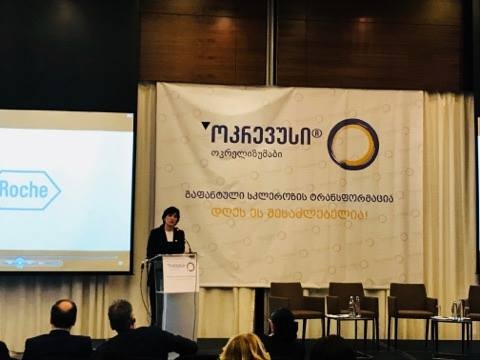Tbilisi Hosts Scientific Conference on Modern Multiple Sclerosis Management
Hotel Radisson Blu Iveria hosted a scientific conference on "Modern Principles of Multiple Sclerosis Management". The conference was organized under the aegis of the pharmaceutical company Roche Georgia and is connected to the introduction of the innovative drug Ocrevus (Ocrelizumab) onto the Georgian pharmaceutical market.
Professor Ludwig Kappos, Head Physician of the Department of Neurology and Outpatient Clinic at the University Hospital of Basel, was invited from Switzerland to participate in the conference. The conference was also be attended by representatives of the medical field, and media.
Ocrevus is the first and only therapy approved for both primary progressive and relapsing forms of multiple sclerosis.
“The approval of Ocrevus in Georgia is a significant moment for the Georgian patients with Multiple Sclerosis,” explains Nino Ganugrava, Medical Director of Roche Georgia. According to her, despite available therapies, some patients with relapsing forms of Multiple Sclerosis continue to experience disease activity and disability progression and require modification of treatment. “Ocrevus is a new choice for them. And patients with primary progressive multiple sclerosis, who have never had an approved treatment, will have the opportunity to be treated with this therapy. Ocrevus has the potential to transform the treatment of both relapsing forms of MS and primary progressive MS.”
The goal of the Scientific Conference is to launch Ocrevus for multiple sclerosis treatment, as a “modern medicine achievement for Georgian patients.”
Multiple sclerosis is a chronic, progressive neurological disease that affects an estimated 2.3 million people worldwide. The first symptoms occur between 20 and 40 years, and that is why multiple sclerosis is the main cause of non-traumatic disability in younger patients. There are several forms of disease:
• Relapsing-remitting MS (RRMS) is the most common form of disease (80-85%) and is characterized by episodes of new or worsening signs of symptoms (relapses) followed by periods of recovery (remission). Remission typically lasting from a few months to a few years.
• The majority of people who are diagnosed with RRMS will eventually transition to Secondary progressive MS (SPMS) in which they experience steadily worsening disability over time. Relapsing forms of MS (RMS) include people with RRMS and people with SPMS.
- The Primary Progressive MS (PPMS) is a debilitating form of the disease marked by steadily worsening symptoms but typically without distinct relapses or periods of remission. Approximately 15% of people with MS are diagnosed with primary progressive form of disease.
People with all forms of MS experience disease activity – inflammation of the nervous system and permanent loss of nerve cells in the brain. It should be noted that this process may occur even if the patient does not have clinical symptoms. The main goal of treating multiple sclerosis is to reduce the disease activity as soon as possible to slow progression of disabilities. Despite available disease modifying treatments some people with RMS continue to experience disease activity and disability progression.
Ocrevus is the first and only therapy approved for both primary progressive and relapsing forms of multiple sclerosis. The effectiveness and safety of Ocrevus was confirmed by large-scale clinical trials (OPERA I, OPERA 2, ORATORIO). Ocrevus delivers superior reduction in disease activity and risk of disability progression.












